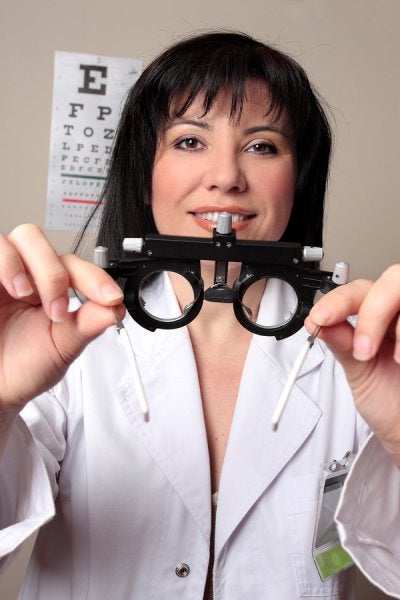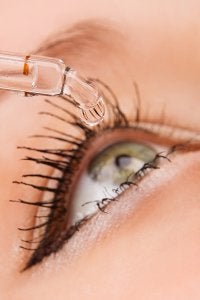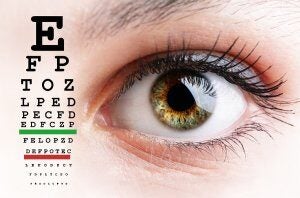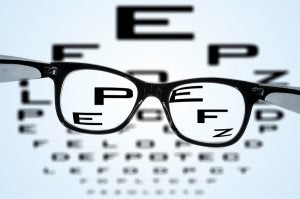-
Relieving Computer Eye Strain
Looking for an optician in Chicago to relieve your computer eye strain? Computer eye strain is becoming a common problem, as technology has found its way into our personal and professional lives. Fortunately, there are some measures your eye doctor may recommend to prevent eye strain while using the computer.

1. Have your eyes examined.
In order to prevent or treat vision problems, the first and most important thing you should do is visit your ophthalmologist for a yearly eye exam. He or she will be able to notify you of any current problems and test your eyes at a specific working distance. That way, you’ll have a better idea of how to prevent future eye strain.
2. Get an upgrade.
Is your computer basically a retro novelty item? It might be time for an upgrade. Flat screen LCD displays, such as those you see on modern laptops, are so much easier on the eyes than old tube-style monitors because they have a higher resolution and don’t cause images to flicker. If possible, go ahead and choose a large display—doing so will make computer time a more comfortable experience for your eyes.
3. Ask for computer eye glasses.
Your local optical center can provide you with a special prescription for computer eye glasses. This is a great choice for those whose current eyewear is uncomfortable after an extended time behind the screen. For example, those who wear contact lenses may often note that they become dry and irritating after computer work. In addition, bifocals or progressive lenses are not optimal for computer usage; computer glasses may be a better choice during screen time.
4. Take mini-breaks.
It’s important to give your eyes—and your neck, back, and shoulders—several breaks throughout the workday if you spend most of your time at the computer. There’s no need to worry that doing so will cause you to lose focus. Mini-breaks should actually increase your productivity and improve how you feel while you’re working. In addition, they reduce the risk that your eyes will “lock up” after prolonged digital screen usage.
-
Taking Care of Your Eyes In The Winter
 Due to dry, cold winter air and the use of indoor heating, people are much more likely to seek dry eye treatment in Chicago during the winter. Dry eye symptoms can be uncomfortable, and can prevent you from participating in activities that you enjoy. Here are a few ways that you can protect your eyes in the winter and reduce your need for dry eye treatment.
Due to dry, cold winter air and the use of indoor heating, people are much more likely to seek dry eye treatment in Chicago during the winter. Dry eye symptoms can be uncomfortable, and can prevent you from participating in activities that you enjoy. Here are a few ways that you can protect your eyes in the winter and reduce your need for dry eye treatment.Don’t Sit Directly In Front of Heating Vents
The hot, dry air from heating vents or space heaters can severely irritate your eyes, particularly if you wear contact lenses. To avoid suffering from dry eyes, try not to sit directly in front of a space heater or the heating vents in your home. You can also redirect the heating vents in your car so that they aren’t blowing directly on your face. If you do wear contact lenses, you may want to switch to eyeglasses when you’re at home with the heater on.
Protect Your Eyes When You Go Outside
Cold air can also make your eyes irritated and dry, and cold wind can further exacerbate dry eye symptoms. If you’re going to be outside for a long period of time, wear sunglasses or eyeglasses to protect your eyes from the cold air and wind. Eye drops are an effective and affordable dry eye treatment that can restore moisture to your eyes, and significantly reduce redness, itching, and irritation that may be caused by cold air and wind.
Buy a Humidifier for Your Home
If you run a heater regularly in your home, it will reduce the moisture of your indoor air. This can make your eyes irritated, itchy, and dry. To restore moisture to your indoor air, you can buy a humidifier. Humidifiers release water vapor or steam into the air to make it more humid. You can also install a central humidifier in your home’s heating unit to humidify your entire house and combat dry air and dry, itchy eyes.
-
The Importance of Routine Eye Exams
 If you experience any eye abnormalities, such as eye pain or a sudden loss in vision, you should see an eye doctor promptly. However, it’s also important to schedule routine visits with an ophthalmologist near Chicago. There are many eye conditions that do not result in symptoms or may not cause symptoms right away. By visiting an ophthalmologist for routine eye exams, you’re safeguarding your healthy vision for a lifetime.
If you experience any eye abnormalities, such as eye pain or a sudden loss in vision, you should see an eye doctor promptly. However, it’s also important to schedule routine visits with an ophthalmologist near Chicago. There are many eye conditions that do not result in symptoms or may not cause symptoms right away. By visiting an ophthalmologist for routine eye exams, you’re safeguarding your healthy vision for a lifetime.Vision
An important component of a routine eye exam at an optical center involves checking your vision. For children, this is particularly critical because normal vision development has a direct effect on academic success. Children with impaired vision cannot see the chalkboard or their homework assignments clearly, and they may fall behind. However, vision exams for adults are also necessary to ensure that their current prescription is correct. Without an accurate prescription for eyeglasses or contact lenses, it can be difficult to fulfill job responsibilities and carry out day-to-day tasks.
Eye Diseases
A routine eye exam involves much more than just checking your vision. Your eye doctor will also evaluate your eyes for any signs of diseases. He or she will check for signs of glaucoma, retinal disorders, macular degeneration, and diabetic retinopathy. By detecting these eye diseases as early as possible, you can become informed about your treatment options and ways of preventing further damage.
Eye Problems
There are many other eye conditions that your ophthalmologist may detect during a routine eye exam. For example, your eye doctor can tell if you have strabismus, or an improper eye alignment. This condition interferes with depth perception and may lead to amblyopia, which in turn can cause irreversible vision impairment.
Systemic Conditions
Did you know that eye doctors can often detect systemic health problems in patients? An ophthalmologist can let you know if your eyes are displaying minute changes that could signal a serious health issue, which means you can begin receiving treatment from your physician as soon as possible. For example, an ophthalmologist can often detect the early signs of high cholesterol levels and high blood pressure. Eye doctors can also assess whether the tiny blood vessels in your eyes are leaking and whether the macula is swollen. These changes indicate that you may have diabetes.
-
How Often Do You Need New Prescription Glasses?
 If you want to get the best vision, it is important to get new glasses when your prescription changes. Use this guide to determine when you should schedule an eye exam with your ophthalmologist to see if your prescription has changed.
If you want to get the best vision, it is important to get new glasses when your prescription changes. Use this guide to determine when you should schedule an eye exam with your ophthalmologist to see if your prescription has changed.Most eye doctors suggest getting an exam at least once every two years. If your prescription has changed frequently or if you are having difficulty seeing, you might want to go in for an exam every year. This way, the ophthalmologist can give you a thorough exam to see if there are any health concerns and to make sure your current prescription is serving you well.
Whether you want new glasses or a LASIK consultation in Chicago, you have to find an eye doctor you can trust. Schedule an appointment with an ophthalmologist to get an eye exam and to see if you feel comfortable with the doctor so you keep your regular appointments.
